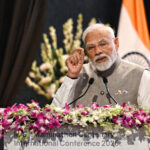The North News
New Delhi, April 16
In a dramatic escalation of the US-China trade dispute, President Donald Trump has imposed tariffs of up to 245% on Chinese imports, citing Beijing’s retaliatory measures and trade practices that Washington describes as exploitative and non-reciprocal.
The White House announced the sweeping measure on Wednesday, marking one of the highest tariff rates ever levied by the United States. In a detailed statement, the US administration said the move is part of a broader push to protect American industry, secure national interests, and curb overdependence on adversarial nations for critical supplies.
“China now faces up to a 245% tariff on imports to the United States as a result of its retaliatory actions,” the White House said.
The measure is part of President Trump’s “Fair and Reciprocal Plan” to address long-standing trade imbalances and perceived economic coercion. As part of this, Trump signed several executive actions include closing loopholes to fully restore a 25% tariff on steel and raise aluminum tariffs to the same level, launching investigations into whether imports of copper, timber, and related goods threaten national security and considering tariffs on digital services taxes imposed by foreign governments on American tech firms.
The White House said the new policy strengthens America’s industrial resilience and addresses practices such as dumping, price manipulation, and arbitrary export restrictions by foreign governments, particularly China.
A central concern of the policy shift is the United States’ reliance on foreign critical minerals—materials vital to defense systems and high-tech industries. The US President warns that dependency on nations like China for rare earth elements and other high-tech minerals poses risks to economic and national security.
These concerns intensified recently after China suspended exports of six heavy rare earth metals and rare earth magnets, widely used in automotive, aerospace, semiconductor, and military sectors. The move follows earlier Chinese bans on materials like gallium, germanium, and antimony—minerals essential for everything from missile guidance systems to secure communications.
“Processed critical minerals and their derivative products are key building blocks of our defense industrial base,” the White House said. “China’s stranglehold on these resources is a geopolitical tool we can no longer ignore.”
The tariff announcement underscores Trump’s continued embrace of his “America First” doctrine, first initiated during his earlier presidency. Since then, more than 75 countries have entered discussions on new trade deals with the U.S., according to officials. However, China has not stepped back and continues to retaliate—prompting Wednesday’s sweeping response.
With the latest move, the US hopes to push China toward a more “reciprocal” trading relationship, while shoring up domestic industries from what the administration describes as systematic economic threats.
















